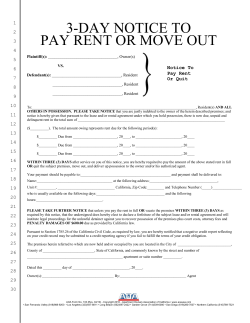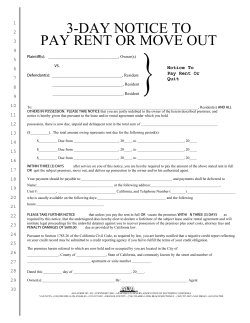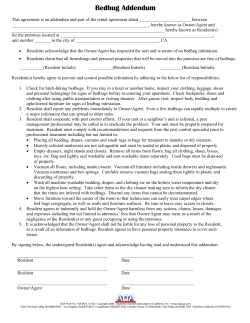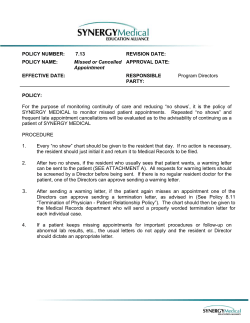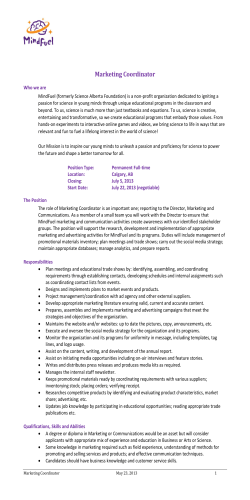
Policy and Procedure Manual
Policy and Procedure Manual Financial (FN) Table of Contents FN-01 FN-02 FN-03 FN-04 FN-05 FN-06 FN-07 FN-08 FN-09 FN-10 FN-11 FN-12 FN-13 FN-14 FN-15 FN-16 FN-17 FN-18 FN-19 FN-20 Chart of Accounts Insurance Coverage Record Retention and Storage Lease Obligations Fixed Assets and Capital Purchases Bank Reconciliation Balance Sheet Reconciliations Financial Conflicts of Interest Check Signing/Banking Accounts Payable Petty Cash Fee Schedule and Rate Changes Billing and Accounts Receivable Resident Refunds Financial Statements Journal Entries for Non-Check Transactions Resident Discretionary Funds Activities Funds Resident Credit Card Use Annual Budget POLICIES AND PROCEDURES SUBJECT: CHART OF ACCOUNTS ISSUE DATE: September 1, 2008 REVIEWED/REVISION DATE: March 31, 2013 PAGE 1 of 1 POLICY No. FN-01 PROGRAM: All POLICY: It is the policy of RHG to maintain a current chart of accounts that provides for identifying specific revenues and expenses separately. The chart of accounts is defined by guidelines developed by the Managing Director and the company’s authorized tax professional, David A. Batten, CPA. PURPOSE: To provide guidance to all for (1) coding of assets, liabilities, revenue and expenses and (2) preparing annual line item budgets and (3) to provide clarification on the utilization of each component of the chart of accounts. PROCEDURE: 1. The Managing Director, or designee, develops and maintains the chart of accounts, adding or inactivating accounts as necessary in QuickBooks Online Edition. 2. The Managing Director, or designee, is responsible for ensuring the new accounts are included in the appropriate financial statement formats. 3. All revenues and expenses are entered by the appropriate Program Class. 4. If there are questions regarding creating a new account or editing any current accounts in the chart of accounts, The Managing Director, or designee, shall contact BMJ, CPA and the company approved Enrolled Agent tax professional, for guidance. POLICIES AND PROCEDURES SUBJECT: INSURANCE COVERAGE ISSUE DATE: September 1, 2008 REVIEWED/REVISION DATE: March 31, 2013 PAGE 1 of 1 POLICY No. FN-02 PROGRAM: All POLICY: It is the policy of RHG to maintain appropriate levels of insurance coverage and to include an annual review of insurance coverage prior to policies being renewed. Required insurance coverage includes, but is not limited to: Property—to include all owned and leased buildings and contents, vehicles, computers and all other owned and leased properties. This coverage also includes business interruption insurance for all locations in which the company does business. Directors/Officers—limits and coverage to be reviewed and approved by the Managing Director on an annual basis. General and Professional Liability Coverage—to be appropriate based on the level and type of activities being provided by the agency. Worker’s Compensation—coverage for employees injured in the course of their employment. Terrorism—coverage for loss of property or business due to acts of terrorism. PURPOSE: To provide assurance that the company has adequate financial protection against possible loss. PROCEDURE: 1. The Managing Director is charged with the responsibility of ensuring that all company insurance coverage is maintained at adequate levels. 2. The Accounts Payable Coordinator copies invoices for any capitalized purchases, lease contracts or any other items that the insurance company needs to be notified of in order to keep the coverage current and forwards to the Managing Director. 3. The Managing Director notifies the insurance company of any additions and deletions within fifteen days when the change involves equipment with the cost in excess of $5,000 and within forty-eight hours when adding/deleting facilities, both owned and rented. 4. Three months prior to the beginning of the policy year, the Managing Director meets with the insurance agent to review all insurance coverage. 5. The Managing Director is charged with the responsibility of insurance renewals. POLICIES AND PROCEDURES SUBJECT: RECORD RETENTION AND STORAGE ISSUE DATE: September 1, 2008 REVIEWED/REVISION DATE: March 31, 2013 PAGE 1 of 1 POLICY No. FN-03 PROGRAM: All POLICY: It is the policy of RHG that all accounting records are stored in a locked area. Records will be retained in accordance with contract requirements, and applicable local, state, and federal laws. PURPOSE: To provide specified instructions to staff for the storage and retention/disposal of accounting records and to ensure that accounting records are maintained according to contractual and legal obligations. PROCEDURE: 1. All accounting, financial and payroll records are to be kept in a locked area. 2. Current bank statements, investment statements, contracts and other critical documents are kept in a locked area on site. 3. Immediate prior-year records are boxed, labeled and then stored in a locked area with limited access. 4. All accounting and payroll records older than the previous fiscal year may be maintained in a designated storage area on or off property. 5. All accounting, fiscal, contract and payroll records will be kept for a minimum of seven years. 6. After seven years, records may be destroyed at the discretion and in a manner approved by the Managing Director. POLICIES AND PROCEDURES SUBJECT: LEASE OBLIGATIONS ISSUE DATE: September 1, 2008 REVIEWED/REVISION DATE: March 31, 2013 PAGE 1 of 1 POLICY No. FN-04 PROGRAM: All POLICY: All leases, regardless of term or total cost shall be signed by either the President or Vice President/Managing Director of the company. PURPOSE: To ensure that no staff member can encumber the organization for a significant amount of money over an extended period of time without (1) knowledge of the organization’s ability to assume the lease, and (2) the review and approval of the Governing Board. PROCEDURE: 1. The Governing Board negotiates reviews and ensures there is adequate funding in the budget for all leases. 2. Original leases and contracts are maintained in the Accounts Payable Coordinator’s office. 3. The Managing Director may authorize company credit card accounts based on organizational need. The Accounts Payable Coordinator or designee is responsible for setting up accounts and maintaining credit cards in a secure location. POLICIES AND PROCEDURES SUBJECT: FIXED ASSETS AND CAPTIAL PURCHASES ISSUE DATE: September 1, 2008 REVIEWED/REVISION DATE: March 31, 2013 PAGE 1 of 1 POLICY No. FN-05 PROGRAM: All POLICY: It is the policy of RHG to capitalize all acquisitions of long lasting, substantial property and equipment with a cost in excess of $1000, to depreciate those items over their useful life. RHG will maintain a detailed schedule of fixed assets, including date of acquisition, cost and location. The company will complete a physical inventory of all fixed asset items on an annual basis. Disposal of fixed assets requires the approval of the Managing Director. PURPOSE: To provide a method of tracking fixed assets to reduce the likelihood of theft and loss, and to ensure the accuracy of bookkeeping and financial records. PROCEDURE: 1. The bookkeeper, or designee, is responsible for the upkeep of the fixed asset inventory schedule. 2. The bookkeeper, or designee, will enter purchase of fixed assets into QuickBooks Online Edition. 3. The bookkeeper, or designee, is responsible for recording all disposals of fixed assets and for making sure that depreciation is calculated appropriately. 4. Prior to the end of the fiscal year, the bookkeeper, or designee, prepares an “inventory detail” for the Managing Director. 5. Prior to disposal of any asset, the bookkeeper, or designee, will obtain the Managing Director’s approval. POLICIES AND PROCEDURES SUBJECT: BANK RECONCILIATION ISSUE DATE: September 1, 2008 REVIEWED/REVISION DATE: March 31, 2013 PAGE 1 of 1 POLICY No. FN-06 PROGRAM: All POLICY: It is the policy of RHG to reconcile all bank statements within ten (10) working days of receipt and to perform the bank reconciliation function. PURPOSE: To assure bank reconciliations are completed prior to financial statements being issued and to allow for timely corrections of any bank errors. PROCEDURE: 1. The Managing Director reviews and gives the opened bank statements to the bookkeeper, or designee. 2. The bookkeeper, or designee, reviews the statements and puts each set of checks in numerical order. 3. The bookkeeper, or designee, uses QuickBooks Online Edition to clear deposits, checks and other bank activity and to reconcile each cash account. 4. Checks outstanding for more than 90 days should be investigated. When appropriate, payment is stopped, the original check voided, and if appropriate, the check is reissued. 5. Once the statements are reconciled, the bank reconciliation reports and bank statements are given to the Managing Director for review and approval. 6. The bookkeeper files the approved bank reconciliation reports and bank statement in the individual bank account folders. POLICIES AND PROCEDURES SUBJECT: BALANCE SHEET RECONCILIATIONS ISSUE DATE: September 1, 2008 REVIEWED/REVISION DATE: March 31, 2013 PAGE 1 of 1 POLICY No. FN-07 PROGRAM: All POLICY: It is the policy of RHG to reconcile balance sheet accounts on a quarterly basis and to compare general ledger control totals with detail sub-ledgers for accounts receivable and accounts payable. PURPOSE: To ensure the balance sheet is accurate when presented on a monthly basis. PROCEDURE: 1. The bookkeeper, or designee, prepares aged accounts payable detail report that reconciles to the balance sheet in the account payable ledger. 2. The Managing Director reviews the fixed asset detail schedule and verifies that the asset cost and accumulated depreciation totals agree to the general ledger balances in the accounts. 3. The bookkeeper, or designee, makes all monthly journal entries necessary to expense prepaid assets. Once these entries are made, the general ledger balances in each prepaid asset account and is reconciled to the balance of the prepaid asset schedules. POLICIES AND PROCEDURES SUBJECT: FINANCIAL CONFLICT OF INTEREST ISSUE DATE: September 1, 2008 PAGE 1 of 1 POLICY No. FN-08 REVIEWED/REVISION DATE: March 31, 2013 PROGRAM: All POLICY: It is the policy of RHG that no member of the Executive Team or member of his/her family shall directly or indirectly financially benefit from their association with Renaissance Healthcare Group without full disclosure and that all transactions be true arms length transactions. It is the policy of RHG that no staff member or member of his/her family shall directly or indirectly financially benefit from their association with the company. Any questions regarding staff conflict of interest should be directed to the Managing Director. PURPOSE: To provide guidance regarding conflict of interest for the Management Team and staff. PROCEDURE: 1. Financial transactions of the company which involve the Executive Team shall be subject to the same policies and procedures as all other such transactions. 2. Real estate transactions must be at market-appraised value of less when a company member, Director or Officer benefits from, or directly participates in the transaction. 3. The procedure for declaring and ruling on possible conflict of interest will be as follows: A company Member, Director or Officer suspecting a possible conflict of interest shall declare same to the President/Managing Director. The President/Managing Director shall rule as to whether or not there is a conflict of interest. The Member, Director, Officer or staff in conflict may participate in the discussion of the matter prior to the determination. In the event it is determined that a conflict exists, the Member, Director, Officer or staff determined to have a conflict shall not have a vote as to the resolution of the conflict. Any issue on which a determination of a conflict of interest has been made shall require a majority of the vote of the Members eligible, and shall be duly reported. POLICIES AND PROCEDURES SUBJECT: CHECK SIGNING/BANKING ISSUE DATE: September 1, 2008 REVIEWED/REVISION DATE: March 31, 2013 PAGE 1 of 1 POLICY No. FN-09 PROGRAM: All POLICY: It is the policy of RHG that all checks written against company funds will be signed by and authorized signer. PURPOSE: To ensure that all checks written against company funds are approved by an authorized company representative and signed by an authorized company representative. PROCEDURE: 1. The Accounts Payable Coordinator will receive all checks requests, statements and invoices. 2. The Accounts Payable Coordinator will coordinate online payments or provide to the VP/Managing Director all checks, with supporting documentation, invoices and bills attached to each check for manual signature. 3. The VP/Managing Director shall sign the checks, and route them back to the Accounts Payable Coordinator for distribution and mailing. 4. In the event that the VP/Managing Director is not available to sign the checks, the Managing Director may authorize the use the approved signature stamp in order to process the checks. The signature stamp shall be used infrequently and only with prior approval. POLICIES AND PROCEDURES SUBJECT: ACCOUNTS PAYABLE ISSUE DATE: September 1, 2008 REVIEWED/REVISION DATE: March 31, 2013 PAGE 1 of 1 POLICY No. FN-10 PROGRAM: All POLICY: It is the policy of RHG to: (1) pay all vendors in a timely manner, not to exceed the vendors due date; (2) require appropriate documentation for all distributions: (3) require documentation of receipt of goods prior to payment; (4) require that all disbursement (except petty cash) be made through online system (bill.com). PROCEDURE: 1. The Accounts Payable Coordinator receives, stores and coordinates payments for all vendor invoices and statements based on due dates. 2. Check requests are reconciled with receipts or other supporting documents by the Account Receivable Coordinator or directly through the bookkeeper (via bill.com). 3. For vendors who provide monthly statements, individual invoices should be reconciled with the monthly statements. 4. The bookkeeper shall obtain approval for payment from the Governing Board and then the department manager via bill.com. 5. The bookkeeper syncs approved requests with Quick Books and bill.com and is responsible for disbursements via check. 6. The bookkeeper shall obtain approval from the Governing Board before paying any suspicious, unfamiliar or first time invoice or bill. POLICIES AND PROCEDURES SUBJECT: PETTY CASH ISSUE DATE: September 1, 2008 REVIEWED/REVISION DATE: March 31, 2013 PAGE 1 of 1 POLICY No. FN-11 PROGRAM: All POLICY: It is the policy of RHG to allow the use of petty cash for expenditures for supplies or payments less than $200 and to restrict access to the petty cash fund to the designated parties, which include the Managing Director, Executive Administrator, Client Services Coordinator, and Accounts Payable Coordinator, or designee. Petty cash funds will be established, eliminated or increased based on program needs at the discretion of the Managing Director. PROCEDURE: 1. Petty cash is for purchases of items of an emergency or urgent nature that cannot wait to be processed through the normal purchasing system. 2. All purchases or reimbursements over $200 should be processed via the normal check process. 3. The Accounts Payable Coordinator is assigned complete responsibility for the petty cash fund. 4. Petty cash is obtained via counter checks processed at a branch of Regions Bank. 5. Petty cash requests must be approved prior to the distribution of petty cash funds in exchange for a receipt. 6. In the event that the petty cash request is for a purchase of an unknown amount, the employee must return the receipt and any change back to the Accounts Payable Coordinator. The Accounts Payable Coordinator will reconcile the total of the receipt amount and the funds returned with the original funds disbursed. 7. Petty cash funds shall never be co-mingled with personal funds under any circumstances. Under no circumstance should any staff borrow from petty cash for any reason. Violation of these rules or abuse of petty cash for unauthorized use may result in immediate termination. 8. The petty cash account will be reconciled and replenished on an as-needed basis, at least monthly, by the Accounts Payable Coordinator, who provides a monthly report to the Managing Director at the end of each month. The Managing Director, or designee, makes the appropriate entries into QuickBooks Online Edition to account for petty cash. 9. Cashing checks from petty cash is strictly prohibited. POLICIES AND PROCEDURES SUBJECT: FEE SCHEDULE AND RATE CHANGES ISSUE DATE: September 1, 2008 REVIEWED/REVISION DATE: March 31, 2013 PAGE 1 of 2 POLICY No. FN-12 PROGRAM: All POLICY: It is the policy of RHG to keep a current fee schedule and to provide the current fee schedule upon request by resident, family or referent. The company may also post the current fee schedule on the website. It is also the policy of RHG to charge prices in line with the current fee schedule, and to provide a mechanism for administrative discounts and/or scholarships, as appropriate. PURPOSE: To provide a current fee schedule at all times and mechanisms to vary from the fee schedule, as approved and appropriate. PROCEDURE: 1. The governing body approves the rate schedule and communicates this to the Managing Director. The governing body shall approve rate schedules at least annually. 2. The Managing Director is responsible for communicating to the Admissions Coordinator, Client Services Coordinator, Referral Relations personnel, Clinical Services Managers, and other key staff any changes in the fee schedule. 3. Responsible staff then update the Fee Schedule Policy in the Policy Manual, as well as the website, financial agreements and any other relevant documents. 4. Billing staff invoices residents each based on the current fee schedule and admission. 5. Rates will not be changed during treatment, with a length of stay less than two years, if the rates change during treatment. 6. For lengths of stay over two years, Administration may apply the newest rates to the account. 7. The resident or financial sponsor must pay one month In advance for residential treatment and three months in advance for TLLC. 8. The company will not provide any refunds of prepaid amounts in the event of a discharge against medical advice (AMA), or other discharge that is not known by and approved by the treatment team. 9. For regular and treatment team approved discharges, a refund of the prorated, unused balance of any prepaid amount will be refunded. 10. If a resident or family requests a discount to the current fees, such request must be forwarded to the POLICIES AND PROCEDURES Managing Director. No rate discounts are given for new admissions. 11. For active residents of the program, who are motivated and compliant with treatment, the Managing Director may approve rate discounts when a family demonstrates financial need. 12. If a resident is non-compliant and utilizing a high level of staff and program resources, the Managing Director shall not approve a discount of fees, even if the family demonstrates financial need. 13. Rate changes due to level of service changes or transfers between our programs must be accompanied by a Rate Change Form, duly signed by the resident or financial sponsor and witnessed by staff. This will ensure that the resident or financial sponsor has guaranteed payment for the current level of service, whether more or less costly than the initial level of service. POLICIES AND PROCEDURES SUBJECT: BILLING AND ACCOUNTS RECEIVABLE ISSUE DATE: September 1, 2008 REVIEWED/REVISION DATE: June 7, 2013 PAGE 1 of 2 POLICY No. FN-13 PROGRAM: All POLICY: It is the policy of RGH to bill residents according to established policies and to manage accounts receivable to minimize delinquent accounts. PURPOSE: To provide clear policies for billing and collection of payments due. PROCEDURE: 1. At the time of admission or enrollment, resident and/or financial sponsor MUST sign either a Financial Responsibility Contract, for residential treatment, or an Enrollment Agreement, for TLLC. 2. The financial and enrollment agreements shall specifically and clearly state the rate that will be charged for services, and the frequency of billing. The agreements shall also clearly stipulate any late fees that may apply, as well as the refund policy. 3. The financial and enrollment agreements are legal guarantees of payment. 4. Upon admission or enrollment, the Admissions Coordinator shall communicate to the Client Services Coordinator, or designee, the rates for the new residents. It is the responsibility of the Client Services Coordinator to obtain the first payment for admission or enrollment. 5. The Client Services Coordinator shall send out invoices to all residents between the 15th and 17th of each month, with a due date of the 27th of that month, for services of the following month. The invoices shall be processed through QuickBooks Online Edition. All payments shall be prepaid in full, in advance, each month. 6. As payments are received, the CSC, shall make appropriate deposits, process appropriate credit card payments, and enter all payments into QuickBooks Online Edition. 7. A the end of each month, the CSC and Managing Director shall review the Accounts Receivable Report, and determine which accounts require reminder follow up calls and/or emails. The CSC shall make the appropriate follow up phone calls or emails in order to collect the past due payments. 8. Late fees shall be levied on any account not paid in full by the 5th of the month of service. 9. The company has contracted with an outside insurance billing company, A-Fordable Billing Solutions, to facilitate all claims, billing, utilization review, appeals and collection for residents wishing to attempt to utilize insurance benefits to help pay for treatment. All residents wishing to use their insurance POLICIES AND PROCEDURES benefits must complete ALL required forms and paperwork from A-Fordable Billing Solutions, allowing AFordable to bill on their behalf and allowing the company to receive any insurance payments under an assignment of benefits. 10. Even if insurance benefits are being utilized, the company still requires the financial guarantor to pay for treatment in advance. Any overpayments will be refunded to the financial guarantor. Prior to admission Client Services Coordinator will assist in: Verify insurance benefits, if applicable, through A-Fordable Billing Solutions Coordinate with A-Fordable Billing Solutions and the Utilization Management Coordinator to obtain the necessary forms, documents and information needed to bill insurance, if applicable Collaborate the financial plan for payment of services. Complete and sign all required financial agreements. POLICIES AND PROCEDURES SUBJECT: RESIDENT REFUNDS ISSUE DATE: September 1, 2008 REVIEWED/REVISION DATE: March 31, 2013 PAGE 1 of 1 POLICY No. FN-14 PROGRAM: All POLICY: It is the policy of RGH to establish clear procedures for resident refunds and for communicating these policies to customers. PURPOSE: The purpose of this policy is to provide procedures for resident refunds. PROCEDURE: 1. RHG is a private pay company, and does not contract with any insurance company, managed care company or other third party pay or. 2. The Managing Director may make exceptions to this policy and may contract with a third party payor which is willing to meet the payment expectations of the organization. 3. Payments are made by residents monthly, in advance of services being rendered. 4. All refunds must be approved by the Managing Director before being paid. 5. Refunds are only approved for resident discharges when the discharge was planned, in conjunction with the treatment team, and the treatment team knew the date of the planned discharge. 6. Refunds may also be approved for residents when it is mutually agreed that the resident is not a good fit, and would be better served in another treatment facility. In such a circumstance, the resident shall be discharged directly to the other treatment program, and not to home. 7. The company shall assess a 3 day per diem fee for residents who discharge against medical advice (AMA), who leave the program without advance notice and without the involvement of the treatment team, or who leave the program due to non-compliance. 8. The program may discharge any resident from services who is non-compliant and who is a detriment to the safety or care of the other residents. In such instances, the company shall not refund any prepaid amounts. 9. RHG may contract with outside billing agencies to assist families who wish to use their health insurance benefits to cover the cost of services. All insurance claims will be submitted through the outside agencies only and not directly through RHG. 10. If insurance claims are approved and payment is received from an insurance provider to RHG, RHG POLICIES AND PROCEDURES will refund the payer according to the dates of service detailed with the corresponding payment. 11. Payers may request a refund check for pre-payments made by them after an insurance provider makes payment for corresponding dates or they may add the refunded amount to the balance of their account. 12. Refund checks are printed and mailed by the 1st of the month following the request. POLICIES AND PROCEDURES SUBJECT: FINANCIAL STATEMENTS ISSUE DATE: September 1, 2008 REVIEWED/REVISION DATE: March 31, 2013 PAGE 1 of 2 POLICY No. FN-15 PROGRAM: All POLICY: It is the policy of RGH to require monthly presentation of a complete set of Financial Statements (income statement/P&L) and statement of financial position (balance sheet) in adherence with generally accepted accounting principles. The income statement will reflect a comparison of prior year to actual revenues and expenses for the current period and the year to date. PROCEDURE: 1. The bookkeeper, or designee, must ensure that all revenues and expenses are entered on a timely basis during the month. 2. The Managing Director, or designee, ensures that a complete set of Financial Statements and statement of financial position is prepared each month. 3. The income statement must compare monthly and year to date to prior year, and also to budget. The Managing Director may provide explanations for significant variances. 4. The Managing Director shall distribute the financial statements by the 15th of each month, for the previous month to the applicable parties. POLICIES AND PROCEDURES SUBJECT: JOURNAL ENTRIES FOR NON-CHECK TRANSACTION ISSUE DATE: September 1, 2008 REVIEWED/REVISION DATE: March 31, 2013 PAGE 1 of 1 POLICY No. FN-16 PROGRAM: All POLICY: It is the policy of RGH to provide specific and detailed guidance in order for journal entries to be made to QuickBooks Online Edition to account for all non-check activity and electronic and automatic payments and deposits. PURPOSE: To provide a system that ensures that all non-check, electronic and automatic payments and activities are accurately and timely recorded into QuickBooks Online Edition. PROCEDURE: 1. Every Monday, the bookkeeper, or designee, shall print off the online statements of the checking accounts for both, Renaissance Healthcare Group, LLC and Colonialtown Properties, LLC. 2. The bookkeeper, or designee, shall note all non-check activity, and if there are any questions as to the transactions or relevant accounts, the VP/Managing Director shall be consulted. 3. The bookkeeper, or designee, shall make appropriate journal entries into the QuickBooks Online Edition to reflect all relevant account activity. 4. At the end of the month, a final statement shall be printed off, and all month end journal entries shall be made. POLICIES AND PROCEDURES SUBJECT: RESIDENT DISCRETIONARY FUNDS ISSUE DATE: September 1, 2008 REVIEWED/REVISION DATE: March 31, 2013 PAGE 1 of 2 POLICY No. FN-17 PROGRAM: All POLICY: It is the policy of RHG to deposit monies received on behalf of residents for discretionary spending into a Florida or TN bank account and allow access to the resident or designee of the Administrative Office through the use of purchasing cards or cash. It is the policy and responsibility of RHG to insure the safety of all funds belonging to it residents. Access to these funds is limited to residents who have funds on deposit and by the designee from the Administrative Office or through individual purchasing cards authorized by the designee for individual residents. Authorized access limits will be established for each resident based on a reconciliation of funds deposited and funds expended weekly by the Accounts Payable Coordinator. PURPOSE: To provide for the control and management of resident discretionary funds accounts as deemed appropriate by the Managing Director. PROCEDURE: 1. The resident funds are for providing discretionary spending funds for the programs’ residents. 2. All purchases are monitored weekly to ensure residents do not exceed spending limits imposed by amounts of deposit and therapeutic guidelines. 3. It is recommended that no resident shall have in his/her possession more than $50 in cash. Residents are allowed to keep more than this amount in his/her own room’s safe, if so desired. 4. Should a resident receive funds totaling more than the above amount, the funds are to be kept locked in the nurse’s station for safe-keeping. 5. A resident holding account will be established, which will provide the resident’s name, amounts of deposit, and check number and amounts of withdrawal in the electronic record. 6. Should a resident wish to have funds from the holding account, cash in the amount desired shall be withdrawn from the account, and the transaction shall be noted in the electronic record by staff. 7. Upon receipt of the requested monies it is the responsibility of the direct care staff to insure the monies are used appropriately and not kept on hand by the resident. 8. The Client Services Coordinator is assigned responsibility for depositing monies into the resident funds account. 9. The Accounts Payable Coordinator has sole responsibility for reconciling deposits and withdrawals POLICIES AND PROCEDURES and providing these amounts to the Client Services Coordinator. 10. Resident funds shall never be co-mingled with personal funds under any circumstances. Under no circumstance should any staff borrow from the resident or resident funds for any reason. Violation of these rules or abuse of resident funds for unauthorized use may result in immediate termination. 11. The resident fund account(s) will be reconciled on a weekly basis by the Accounting Clerk, who provides a monthly report to the Client Services Coordinator for the resident’s financial file and to the Therapist of the resident for treatment planning purposes. 12. RHG will not take funds or property of the resident for the facility’s own use or gain. 13. RHG will not mix its funds with those of the resident. 14. RHG will provide an annual reporting to the resident or the resident’s parent or guardian of the resident’s funds that are being held and disbursed by the facility. POLICIES AND PROCEDURES SUBJECT: ACTIVITIES FUND PAGE 1 of 1 ISSUE DATE: September 1, 2008 POLICY No. FN-18 REVIEWED/REVISION DATE: March 31, 2013 PROGRAM: All POLICY: It is the policy of RHG to designate the use of funds for resident weekend activities in a Florida bank account and allow access through the use of debit cards. Access to these funds is obtained by authorized users through the use of Activities Funds Debit Cards. Authorized users retain receipts from expenditures for reconciliation and replenishment weekly by the Account Payable Coordinator. Activities funds will be established, eliminated or increased based on program needs at the discretion of the Managing Director. PURPOSE: To provide for the control and management of activities funds accounts as deemed appropriate by the Managing Director. PROCEDURE: 1. The activities fund is for providing funds for the programs’ weekend activities. 2. All purchases or group activities over the normal weekly allotment should be requested in advance for approval. 3. The Accounts Payable Coordinator is assigned complete responsibility for reconciling and replenishing the activities funds. 4. Activities accounts are replenished via transfer of funds from the Regions Main bank account. 5. Activities account funds shall never be co-mingled with personal funds under any circumstances. Under no circumstance should any staff borrow from activities account funds for any reason. Violation of these rules or abuse of activities accounts funds for unauthorized use may result in immediate termination. 6. The activities fund account(s) will be reconciled and replenished on a weekly basis by the Accounts Payable Coordinator, who provides a monthly report to the Managing Director at the end of each month. The Managing Director, or designee, makes the appropriate entries into QuickBooks Online Edition to account for resident activities. POLICIES AND PROCEDURES SUBJECT: RESIDENT CREDIT CARD USE of 1 ISSUE DATE: November 1, 2011 REVIEWED/REVISION DATE: March 31, 2013 PAGE 1 POLICY No. FN-19 PROGRAM: All POLICY: It is the policy of RHG to accommodate credit card use for resident billing purposes. Families may elect for auto-payment of monthly fees incurred by RHG on their credit card. Auto-pay forms and credit card numbers will be stored in a locked cabinet the business office only. PURPOSE: To manage the sensitive credit card information of our residents and families PROCEDURE: 1. Families who wish to pay by auto-payment via their credit card must fill out the auto-pay form and sign it prior to the start of auto payment. 2. Accounts on auto payment will still received monthly statements of all charges by RHG. 3. The Client Services Coordinator is responsible for ensuring that all auto payment and credit card information is part of the resident financial file and in a locked cabinet. 4. Credit Card information will not be available for resident purchases, appointments, labs or outside medical expense. 5. Verbal confirmation is not sufficient for auto payment by credit card. 6. Credit card information collected for outside pharmacies cannot be used by RHG for billing and/or purchase purposes. Once it is received by the pharmacy, authorization forms will be destroyed. POLICIES AND PROCEDURES SUBJECT: ANNUAL BUDGET ISSUE DATE: July 1, 2013 REVIEWED/REVISION DATE: PAGE 1 of 1 POLICY No. FN-20 PROGRAM: All POLICY: It is the policy of RHG to develop, review, and approve an annual financial budget which covers both operational financial needs, as well as anticipated capital expenditures. PROCEDURE: 1. During the fourth quarter of the fiscal year, the Governing Board shall initiate the annual budget process. 2. Input will be solicited from key personnel, including the Executive Administrator, Managers and other key personnel. 3. Each staff person engaged in this process shall complete a Budget Planning Worksheet, and return these to Managing Director. 4. The Managing Director shall utilize prior year actual figures, as well as feedback from involved personnel, to establish budget thresholds for the coming year. 5. The annual Budget shall be reviewed and approved by the Board at either the last meeting of the fiscal year, or the first meeting of the budgeted fiscal year. 6. The Budget shall be updated during the Budgeted fiscal year to include actual financial performance as compared to budgeted figures.
© Copyright 2026

